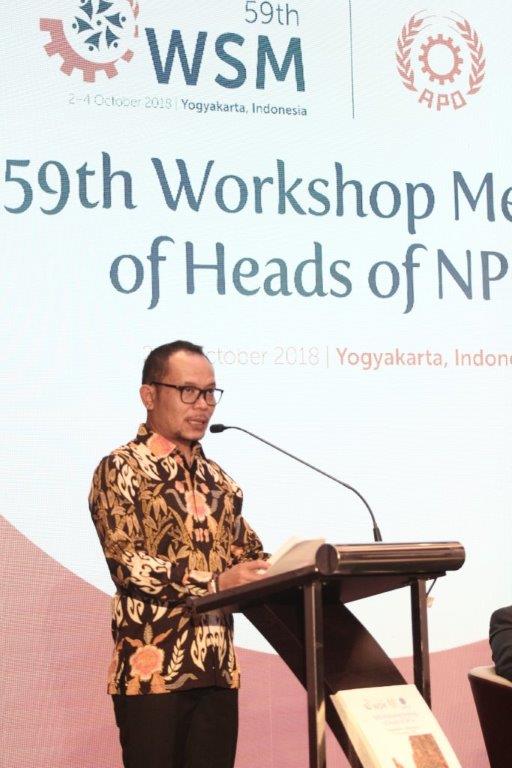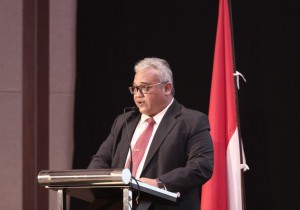
Select Page
Industry 4.0 has tremendous potential for overhauling the economy and changing various aspects of human life, and both developed and developing countries are now trying to extract positive benefits from it, stated Indonesia’s Minister of Manpower M. Hanif Dhakiri at the opening session of the 59th Workshop Meeting (WSM) of Heads of National Productivity Organizations (NPOs) in Yogyakarta, Indonesia.

Indonesia’s Minister of Manpower M. Hanif Dhakiri delivering inaugural address at the 59th Workshop Meeting of Heads of NPOs in Indonesia, 2 October 2018.
The WSM is the annual strategic planning meeting where APO member countries deliberate on the biennial program plan and review initiatives to ensure that they respond effectively to the requirements of their economies. The WSM 2018 agenda includes a presentation of the impact evaluation study of 2016 and 2017 projects and reports on new programs proposed by the Secretariat. During the meeting, representatives of 19 APO member countries will focus on reviewing programs to respond effectively to their changing needs. The proposed projects for the biennium are aligned with the key business transformations introduced after a review of the Roadmap to Achieve the APO Vision 2020.
Sharing details of the steps taken by the Government of Indonesia to strengthen the industry sector, Minister Dhakiri reported that the country had launched the “Making Indonesia 4.0” strategy and roadmap to develop a strong manufacturing sector. The initiative was launched by the Ministry of Industry and several relevant agencies and stakeholders, including the Ministry of Manpower. “The implementation of Industry 4.0 will be accelerated in five sectors: the food and beverage industry; textile and clothing industry; automotive industry; chemical industry; and electronics industry,” the minister explained.
“For Indonesia, the Industry 4.0 phenomenon anticipated through the Making Indonesia 4.0 initiative has given us very big opportunities for increasing the national commitment to work harder and faster in enhancing worker productivity and global competency,” he added, commenting that it would contribute substantially toward increasing national productivity and competitiveness in the global market.
In welcoming delegates, APO Director for Indonesia Bambang Satrio Lelono pointed out that the 59th WSM was important for making sure that APO member countries could benefit from the emerging Industry 4.0 phenomenon. “The long history of the effort to mainstream productivity into the policymaking process as well as development agenda in Indonesia has taught the important lesson that enhancing national productivity needs a strong commitment and concerted efforts at all levels, both national and regional, and in all dimensions, both micro and macro,” he stressed.
As 2018 marked 50 years of Indonesian membership in the APO, Director Lelono believed that it was the most appropriate occasion to invite all parties to accelerate efforts to increase productivity and competitiveness through the National Movement for Increasing Productivity and Competitiveness. He informed delegates that, “We are now preparing the blueprint and roadmap for the movement, which will elaborate all required elements and their mechanisms, while also establishing the institutional network with clear details of the structure, roles, and working mechanisms.”
In his statement to the WSM, APO Secretary-General Dr. Santhi Kanoktanaporn highlighted that there was an urgent need to accelerate the transformation of approaches to improve the productivity of member economies: “I would like to emphasize that the transformation is a journey. We are not going to achieve all the key transformations overnight but will do so progressively in collaboration with member governments, which also need to play their part to ensure success.”

APO Director for Indonesia Bambang Satrio Lelono delivering welcome remarks.
The Secretary-General stated that the major task before the WSM was to discuss how the APO could translate recommendations into action plans while balancing the commitments already made by member governments to the 2019–2020 Program Plan. He announced that the Secretariat was working to implement the Specific National Program and hoped that it would become the primary vehicle for the APO to co-create national productivity initiatives aligned with the specific needs of member governments. “Such initiatives focus on national-level impacts with advice from experienced international experts,” he noted.
Dr. Santhi also informed the meeting that the Secretariat aimed to establish an Accreditation Body Advisory Council comprising eminent representatives of member governments, academic institutions, and industry bodies. “This initiative will support member governments in developing new productivity knowledge and enhancing the APO’s standing as a leading productivity organization worldwide,” he stated.
The three-day WSM, which commenced on 2 October, is attended by NPO representatives, agriculture delegates, and advisers from 19 APO members, along with observers from international partner organizations. During the WSM, NPO Delegate and APO Alternate Director for Indonesia Kunjung Masehat was elected Chair and NPO delegate from the Republic of China Dr. Pao-Cheng Chang as Vice Chair.

Photos: Directorate of Productivity Development, Directorate General of Training and Productivity Development, Indonesia’s Ministry of Manpower